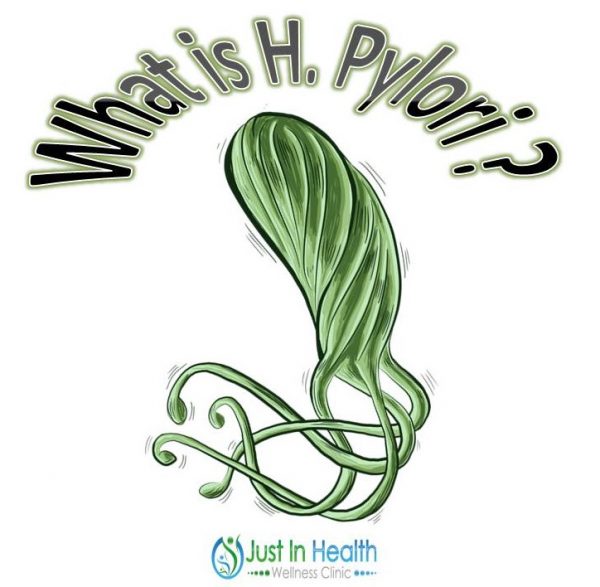
By Dr. Justin Marchegiani
Today’s talk is going to be on H. pylori infections. This is one of the most common infections that I see in my practice and we’re going to outline what H. Pylo is, how we test it, how we treat it, and also what it can do. What kind of problems can it cause to our body? A lot of the symptoms that we tend to see especially with gut infections may not be intestinally based. It may not be the conventional diarrhea, bloating, gas, constipation that most people are associated with.
Most mainstream medical personality, they find that parasite infections in general are something that’s isolated to the third world countries. We tend to see distended belly or lots and lots of diarrhea, or lots and lots of digestive pain. And you may just be somewhere in the middle or you may even be symptomatic. You may have symptoms like brain fog, or just low libido, or neurological pain, or just indigestion, or just low energy. These symptoms may not be a 100% connected, so we want to have a way in which we can use functional medicine. Functional Medicine is a field of medicine that looks at using specialty testing to get to the root cause of what’s driving these issues so we can remove the underlying stressors, thus you can heal.
Your body is set on autopilot to heal. But if we have chronic infections or underlying stressors like blood sugar issues, or environmental toxicities, or chronic infections, or sleep issues, or hormonal imbalances, that’s like holding the e-brake on your car and trying to accelerate. You’re getting nowhere fast. And if you're running, it’s like having a parachute on your back, which may be good for training but it's not good for living your everyday life.

H. pylori is a gram-negative bacteria. So gram-negative versus gram-positive. Those are the only two kinds of bacteria we have. Gram-negative has two walls. Gram-positive has one wall. That’s important. So imagine we have to go scale one wall, it’s going t be a lot easier scaling that one wall and getting over it than it is knocking out two walls.
So here's H. pylori here. Here’s the first wall, number one and here’s the second wall, number two. So I tell my patients think of it as like trying to scale the castle wall but before you scale the castle wall, we have to go over the moat. The drawbridge is up, so we have a moat with alligators and all kinds of things in there that’s a deterrent and then we have the second wall we have which we have to climb as well. So when we knock out these infections, the typical antibiotic protocol for H. pylori would be Prevpac. That’s typically a proton pump inhibitor like Omeprazole or like a Nexium. And then we would use like a Clarithromycin or an Amoxicillin or Bismuth. Something like that to knock it out. Again, those protocols last about 10 to 14 days and there’s lots of side effects.
So we have one and two walls. So we have something in between the first and second wall known as an efflux pump. Think of an efflux pump as the body’s ability or the bacteria’s ability of taking antibiotics. Here’s your antibiotic right here. We’ll entitle it AB. The antibiotic comes in and the body has the ability of taking it and shooting it right back out. Now that’s a problem because if we push the antibiotic back out into the gastrointestinal area, we’re going to have a lot more side effects. We want it to go in here and penetrate deep and go into the second wall and cause disruption. That's the goal. But if we have these efflux pumps pushing it back out, that's not good.

In my opinion, that's why we want to use 2-month, 60-day herbal medicine protocols. This is because one, the herbs are not gonna have as many side effects. Two, we can wear it down by just doing it week after week after week. And we can eventually wear down this mechanism and knock out the H. pylori with very little side effects.
So again, that’s why the antibiotics tend not to be as successful and then also really important. The main reason why we have a lot of issue with H. pylori is because these little critters here, these little guys at the end, these are called endotoxin, otherwise known as LPS, lipopolysaccharide. And just like it says, I’m going to underline that word toxin, it’s literally hepatotoxic on your liver and on your body.
Again, funguses in your body produce mycotoxins. There’s lots of different toxins that are produced by various infections. We call them endo, meaning they are produced within the body. So that's the main reason why H. pylori tends to cause lots of issues. So if we use an herbal medicine protocol, we can bypass these efflux pumps right here and we could eventually wear it down. It's kind of like a war of attrition where instead of winning the war in 10 to 14 days, we’ll win in the war over a couple of month. That is much safer and has much less side effects.
Do you have H. Pylori? Click here to start healing naturally.
Anyone that has a gut infection, I typically recommend a preparation before we go into addressing the gut. We have to stabilize the adrenals, stabilize blood sugar, really get an anti-inflammatory diet dialed in, get sleep dialed in, because dealing with infections can be very stressful on the body.
What can infection do to your gut lining? This is the line that lines your gut, it protects it. H. pylori comes in like this. If you can imagine, here’s your H. pylori, little critter here. It comes in and it can burrow into the tummy like that and it can eventually wear away the lining like. It can actually come in there and create more inflammation in the gut. Now that’s not good.
What H. pylori also does is it takes urea in the gut, so H. pylori produces an enzyme called urease. Then you know it's an enzyme because it ends in –ase. Now we have urea in the gut and what happens with urea when urea gets hits by urease? It breaks urea down.
Urease hitting urea and then what happens, it gets broken down into CO2 and it gets broken down into ammonia. Now this is the really important part because ammonia has a pH of 11. So if we put a whole bunch of ammonia there, that’s a pH of 11, the pH of the stomach needs to be around 2. We have a pH here around 2, 2, and if we come in there and we throw this 11 pH in there, guess what happens to our pH? It starts going up. The pH starts going up, pH increases. If the pH increases, what's going to happen is we’re going to have decreased hydrochloric acid. We’re going to have decreased protein digesting enzymes, such as pepsin. This is important because if we can’t activate these enzymes, we’re not going to be able to break down protein. And if we can’t break down protein, we’re also going to have increased dysbiosis. That means lots of bad bacteria in the gut.
So really important we have this downward spiral that's happening here. H. pylori is breaking urea and this is coming from protein. That’s coming from protein, it’s creating more CO2 and more ammonia and it’s raising the pH in our stomach which is disrupting digestion and causing lots of bad bacteria, so we have this ratio of high amounts of bad bacteria and low amounts of good bacteria.
Let's talk about the infection connection here when we’re diagnosing H. pylori, one of the gold standards in stool testing, because we can actually find the H. pylori molecule in the stool. That’s great. A lot of the other methods are indirect. We’re not actually looking for a piece of H. pylori, we’re looking for a byproduct of H. pylori.
So in the blood, we may look at various antibodies, IgG, IgA, IgM. IgA and IgM are diagnostic of an active H. pylori infection. So we have A, G, and M. And the best ones are going to be M and A for the blood. We also have a breath test which is again we're looking at CO2 production from. We’re taking this glucose drink, we’re looking for the extra CO2 production. Why is that? Let’s go back to what H. pylori does. H. pylori causes what? It causes an increase in CO2 and an increase in ammonia. So what we’re doing is we're looking for increase of this CO2 byproduct with the breath test and that's how that works.
And then also endoscopy is we’re coming there with endoscopic unit down the throat and we’re trying to clip little pieces of the intestinal tract and we’re trying to see if we can actually pick up H. pylori in the tissue. The problem with this is it’s like taking a bucket of water and dipping it into the ocean, pulling it up, and saying, “Oh, there are no fish in that bucket, that means there's no fish in the ocean.” Now erroneous that we know that’s just not true, obviously there’s fish in there. We just maybe not have gotten a sample of that fish. And it’s the same thing with the endoscopy and H. pylori.
Gram-negative bacteria 2 cell walls, very hard to get over the moat and the drawbridge. Herbal medicines tend to do the best. What can it do? It decreases protein digestion, decrease HCl, and increases chance of dysbiosis and other future infections. Again, how we test for the infection connection is outlined here. And also one more thing, H. pylori is actually proven to increase thyroid antibodies.
So here’s your thyroid. Your thyroid is the gland that controls your metabolism and studies have actually shown that when we remove the H. pylori infection, we decrease thyroid antibodies. We decrease thyroid antibodies which means we decrease the destruction of the thyroid gland. So it’s essential because 80% to 90% of all thyroid issues are autoimmune in origin. And we have the most common bacterial infection, H pylori. If it's the most common bacterial infection and the most common thyroid infection, then thyroid antibodies drop.
I think everyone can see the infection connection and how important it is to getting to the root cause of the thyroid issue. So we really want to get the H. pylori eradicated to really knock the thyroid antibodies down. That will decrease the destruction to the thyroid tissue. So that’s lightning bolt right here coming at the thyroid attacking it. Now we can decrease that, we can decrease it if we knock down the H. pylori infection.
Click here to find out if H. Pylori is causing the symptoms that you have.
So again, this is Dr. Justin here. Feel free and subscribe below the video to my various newsletters. I have a Thyroid Newsletter, a video report, as well as a Female Hormone video report. And again, there will be more videos coming soon. Subscribe below so you can stay up-to-date with the most current information.